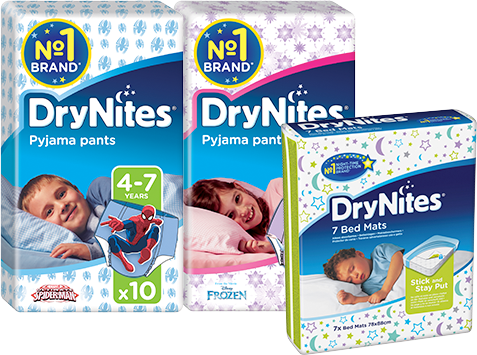Nocturnal Enuresis
Nocturnal enuresis is the medical term for bedwetting. This includes children who have always wet the bed (primary enuresis) plus secondary enuresis (which is when a child over 5 years has been dry for a consecutive period of six months and then starts wetting the bed again). Bedwetting is a common difficulty affecting over 25% of five year olds and 9% of ten year olds. It can be distressing for the children concerned so parents play an important role in providing encouragement and support - to help manage the bedwetting and get through it together.
WHAT CAUSES NOCTURNAL ENURESIS?
While each child will have their own experience, there are some common causes of bedwetting that are worth knowing:
Neurological development delay:
If your child’s nervous system is still developing, their bladder may not be yet signalling to the brain to wake up for a visit to the toilet.
Genetics:
If both parents wet the bed as children, there is a 77% likelihood that their child will also experience bedwetting. This decreases to 43% if it’s just one parent, and 15% if neither of the parents experienced bedwetting as a child.
Under-production of anti-diuretic hormone (ADH):
ADH is a hormone that reduces urine production while we sleep. Some children do not produce enough of this hormone, which causes their bladders to become full during the night.
Small bladder capacity:
Sometimes a delay in bladder development can result in low capacity or a slight “overactivity” and cause the need to urinate during the night.
Constipation:
The enlarged bowel literally “leans” on the bladder – and can cause bedwetting.
Urine Infections:
If having a wee is causing your child pain, or they are passing urine more frequently than usual, do talk to your doctor.
HOW TO MANAGE NOCTURNAL ENURESIS
Providing lots of love and support for your child is key. Bedwetting can be distressing, so it will be reassuring to explain that many children experience bedwetting,
If they’re old enough to use the internet, help them research bedwetting causes and management techniques – being informed can help them feel more in control and build their confidence. The charity called ERIC has plenty of helpful information: www.eric.org.uk
Avoid punishing your child for wetting the bed. It’s not something that they’re in control of, and this can lead to feelings of shame, anxiety, and confusion – and can make the bedwetting worse.
Make sure that your child is not constipated.
Encourage your child to drink good levels of water-based (non fizzy) fluids throughout the day (6-8 glasses is about average). This will help to improve the bladder’s capacity to hold more. You can limit fluids the hour or so before bedtime – but do not deny a thirsty child a drink.
You can praise your child for behaviour that helps the bedwetting – such as going to the toilet without prompting and drinking good levels of fluid during the day.
If you or your child are worried about the bedwetting, or your child has wetting accidents during the day – do speak to you GP, health visitor or school nurse. There should be a children’s continence service in your area to further advise you.


